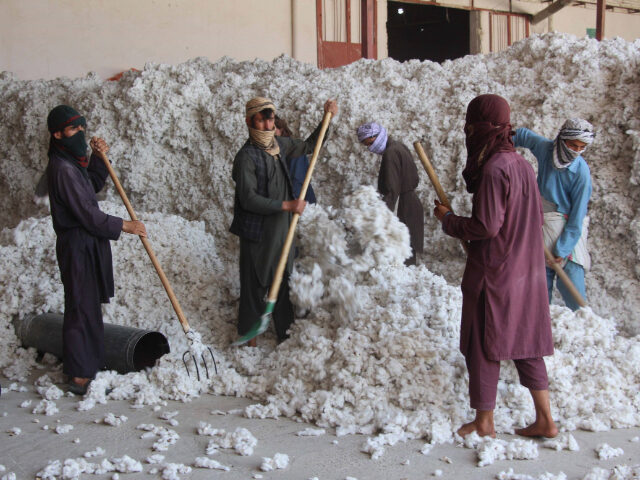A company in Afghanistan called Afghan White Gold signed a contract with China’s Shanghai Chuban Textile in July to export 10,000 tons of cotton from Afghanistan to China.
The $25 million agreement will help the brutal Taliban junta evade international sanctions imposed after it seized power in 2021 and will also help China muddy a cotton supply chain that often includes products that Uyghur Muslim slaves harvest.
The Taliban-affiliated Bakhtar News Agency (BNA) reported on July 11 that the agreement was signed at a National Export Day expo “in the presence of Mullah Abdul Ghani Baradar Akhund, Deputy Prime Minister for Economic Affairs of the Islamic Emirate of Afghanistan, and Nooruddin Azizi, Acting Minister of Industry and Commerce.”
BNA boasted that Afghanistan’s exports are now “ongoing to approximately 80 countries worldwide across 24 commercial sectors.”
The Taliban is keen to lure more international investors to Afghanistan, and China is eager to do business there. Investors from some other countries are nervous about triggering sanctions or doing business with sanctioned individuals.
For example, the Taliban’s supreme leader, Zabihullah Mujahid, installed a henchman named Noor Ahmad Agha as governor of Afghanistan’s central bank in July. Agha is the subject of U.S. counter-terrorism sanctions, as is the governor he replaced, Hidayatullah Badri.
Badri will become the Minister of Mines and Petroleum, bringing the shadow of sanctions to another vital sector of the Afghan economy.
The U.S. has hinted that it might be willing to unfreeze some of Afghanistan’s $7 billion in reserves if the Taliban would at least remove its stooges from important financial positions and replace them with trained professionals, but, so far, the Taliban has shown little interest in doing so.
That has not stopped China, whose trade with Afghanistan hit a record high of $1.33 billion in 2023, a whopping 125-percent increase over the previous year. Chinese companies have made hundreds of millions of dollars in commitments to invest in Afghanistan.
China is an eager importer of Afghan cotton. Production has increased by more than 40 percent in 2024, in part because the Taliban banned cultivation of the country’s previous cash crop, opium poppies. According to the Taliban Ministry of Industry and Commerce, China is one of the top five customers for Afghanistan’s surging cotton exports.
China is also one of the world’s major cotton suppliers, but almost 80 percent of China’s cotton comes from Xinjiang province, known by its Uyghur inhabitants as East Turkistan. China uses the oppressed Uyghurs as slaves, and one of the jobs they are frequently forced to perform is picking cotton.
The U.S. implemented a law called the Uyghur Forced Labor Prevention Act (UFLPA) in June 2022 that presumes all products from Xinjiang, including cotton, are tainted with forced labor unless export companies can prove otherwise.
This is very difficult to do with textiles, so it was quickly apparent the UFLPA would have a major impact on the fashion industry. Chinese companies found some clever ways around the ban, most notably including “micro-shipments” of finished garments to individual buyers in other countries. Very small packages are not subject to the same kinds of inspections and restrictions as bulk shipments, so China’s booming “fast fashion” industry — cheap clothing and accessories sold through e-commerce and shipped directly to individual buyers — provided a means of bypassing the UFLPA.
China is still feeling the pinch from the UFLPA restrictions since much of its export income formerly came from large-volume sales of cotton and textiles to foreign companies. One solution is to import clean cotton and mix it up with China’s domestic supply chain, which is deliberately complex.
Very little of the cotton harvested in Xinjiang is processed there, and slaves are frequently exported to other provinces, making it harder to crack down on the odious practice by simply banning exports from Xinjiang. China exports a large volume of finished textiles to Afghanistan, making it easy to obfuscate the cotton supply chain by mixing cotton from Afghanistan with China’s own harvests or using banned Chinese cotton to make items for Afghan buyers.

COMMENTS
Please let us know if you're having issues with commenting.